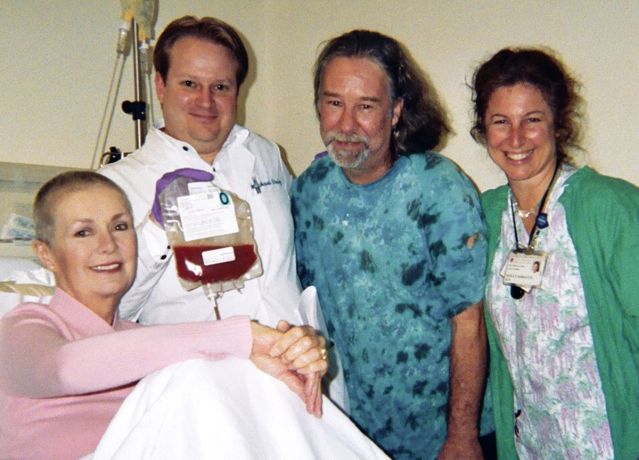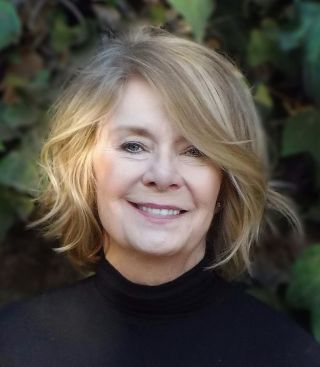The One Person Who Could Save My Life
A cancer diagnosis led me to find my estranged brother and reassess our relationship.
By Susan Keller published March 2, 2021 - last reviewed on March 7, 2021

I had it all—or thought I did. At 55, I was happily married and at the top of my career as a medical writer. But one morning I awoke with blinding back pain. A Google search led me to self-diagnose a kidney infection. I booked a doctor’s appointment, resentful of the disruption for nothing more than antibiotics. I had an annual research report to complete that day for a major medical center.
Thirty minutes after I’d entered my doctor’s office, she showed me the X-ray of my torso. It was covered with bright spots that resembled glistening hailstones scattered on a sidewalk after a storm.
I had Mantle Cell Lymphoma (MCL). Considered incurable, MCL condemns patients to an average life expectancy of about three years. At diagnosis, I was Stage 4, and my bone marrow was a cancerous mush. I had so little oxygen in my bloodstream that a heart attack was imminent.
After months of intensive inpatient chemo, I was emaciated and bald, but, against all odds, in remission. The bad news: MCL has a nasty habit of coming right back. To prevent a quick recurrence, I needed a stem cell transplant. There is a 25 percent chance of being a match with a sibling. I had two brothers, so fifty-fifty didn’t sound too bad.
However, neither of them was a match, and there was no match in the international database of donors. I was in disbelief. I had assumed, trusted, that one of my brothers could donate to me.
But I had a third brother whom I hadn’t mentioned to my oncologist. Johnny was the youngest. I hadn’t seen him in 30 years, hadn’t spoken to him in 20. I had no idea where he was, if he was. When I told my oncologist about him, she took in a sharp breath and said: “Find him. You must.”
Easier said than done.
My alcoholic father left us when Johnny was 4. My mother took out her rage at my father on me, but more often on Johnny. She had never wanted him, but my father had forced her to have a fourth child. When he was just a toddler, she tied Johnny to his crib to keep him out of her way. She locked him out of the house for hours—as she did to all of us. When she beat him, I tried to stop her, but still a kid myself, I couldn’t do much. Her treatment of Johnny and me made me hate and fear her.
Johnny was the brightest of the four of us. He was reading college-level science textbooks at age 10. He could have become a herpetologist, entomologist, or mycologist. But our mother drilled into him that he was a nobody and would amount to nothing.
As soon as I graduated from high school, I left her house in Los Angeles and moved to San Francisco. I felt guilty about abandoning Johnny—knowing that I wouldn’t be there to protect him—but I had my own life to save. A year later, when I was 19 and Johnny 12, my mother phoned me to say that I should raise him. I was living in a tiny studio, working as a waitress, and putting myself through college. I told her it was impossible, but I still wonder if I might have helped.
Right after he graduated from high school, Johnny moved to Huntington Beach. We communicated infrequently. Phone calls were strained. After seven years apart, we had almost nothing in common. Whereas I had a university degree, a career, real estate, a husband, and a daughter, Johnny supported himself doing odd jobs for the owners of a local apartment building and grew and sold psilocybin mushrooms. He also dealt hashish and peyote. Out of love and sincere concern, I encouraged him to find a job that did not carry the risk of prison. He gently told me that my suggestion made him feel judged. After that phone call, he moved and did not tell me where.
Twenty years later, when my husband and I were desperate to find him, I scoured every social media site. I called all his old phone numbers. My brothers Tom and Randy searched his surfing spots and asked around, but he was gone.
Eventually, a woman who knew nothing about me or my search for Johnny complained to a friend of mine about an obscure database that published your name and contact information without notifying you. I’d never heard of the database, but this woman’s rant motivated my friend to search the system, where she ultimately found Johnny’s contact information.
Being in touch with him reminded me of the old days, days I, and I’m sure Johnny, had tried to forget. I was asking him to see me again, to come back into my life. Remarkably, he was a match, and he agreed to help.
While waiting for him to arrive, I felt foreboding, remorse, and even embarrassment at having been estranged for so long. I’m sure we both wondered who the other person had become. When he rang my bell for the first time, I opened the door to a middle-aged man with a salt-and-pepper goatee. I sobbed and collapsed into his arms. He was missing a front tooth. His tie-dyed T-shirt had a hole in the sleeve. I was not surprised by his appearance. I’d always been afraid that he would be poor and would travel down an illegal path. But he was also the same kind and wise little boy I’d always known. There was something so familiar and yet so foreign in our reunion.
Johnny didn’t drive and lived three hours away from my home in the Bay Area. His landlords—who kindly treated him as one of their own—insisted on bringing him down. Coming to my aid was a sacrifice as he had chickens, geckos, and a roomful of finicky marijuana plants that needed daily attention. Selling geckos and cannabis was his source of income.

On his second week-long trip, while undergoing apheresis—the collection of his stem cells—my husband took photos. I handed the camera to Johnny and said, “Look at you, saving my life.”
He cleared his throat and stared at his hands. “You did so much for me, Sis.”
“You deserved way more.”
What did he think I did for him? Did he know that for decades, I railed at our mother about her cruel treatment of him? That my defending him would forever be a wedge between my mother and me?
The night before the transplant Johnny said, “The feeling of not measuring up, the shame of being a poor performer, remained as shadow material throughout my life. This intense feeling of inadequacy created the desire to keep my distance from all family members.”
How tragically ironic that our mother had convinced her most focused and brightest child that he was the one who would never succeed. Johnny said, “I’ve made peace with all that past turmoil. Nothing valuable or creative comes from self-pity. It did take me years to put down the animosities I had toward Mom, but one cannot expect love or compassion from someone who is living in hell.”
His comment stunned me. I cannot imagine how he has stayed as strong, as kind, and as serene as he is.
The transplant took place on a cold, bright morning in March. The plastic bag of exquisite coral stem cells hung on a metal tree next to my hospital bedside. “Oh,” escaped my lips. “That is a miracle.”
“Made to order for you, Sis.”
After the successful transplant, Johnny was ready to get home to his plants and animals. In the 14 years since then, we have seen each other only twice. Both times my husband and I made the trip north to Willits. I sensed that my brother was uncomfortable with us in his home. He’d seen where I live and may have been revisiting those feelings of inadequacy. So I call him, and we email.
Last year, lack of funds forced him to move to a mobile home that he hates. When I suggest, “Why don’t we come up and visit?” he puts me off and complains about the rowdy addicts—“the pillbillies”—and hungry, barking dogs who live all around him.
As grateful as I am for all that he did for me, I realize that sometimes loving can’t be close up. I am beginning to accept that he is more comfortable not seeing me in person. To be honest, I feel the same way. I am ill at ease in his environment with the geckos and the boxes of cockroaches that feed the ever-hungry reptiles. His stories of misfits and criminals make me feel as if I’ve failed all over again. We love each other but are just too different.
Over the years, Johnny’s transplant has kept me cancer-free and healthy. Regardless of our differences—and our lack of happy childhood memories—he and I have an unbreakable bond that no person, or event, can separate. Despite our geographic distance, he lives inside of me. I’ll continue to love and help him, even if it is only from afar. Perhaps that expression of caring is the best I can do. Perhaps that’s all he wants or needs.
Susan Keller is the author of the forthcoming memoir Blood Brother.
Facebook image: Photographee.eu/Shutterstock
